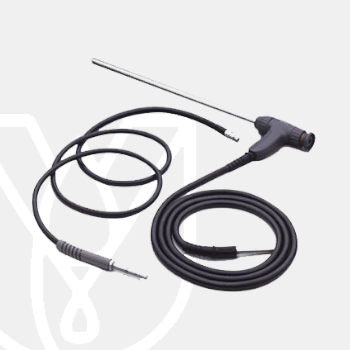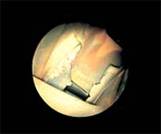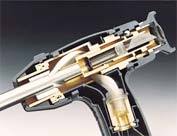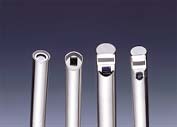
Olympus Standard Rigid Borescopes
Standard Rigid Borescopes are available in a wide range of diameters, working lengths, the direction of view and field of view (magnification). The stainless steel insertion tube is usable at temperatures between -20℃ and 150℃ (-4 to 302°F).
Video recording is available by connecting a CCD camera.
For more information about this product click here.
Olympus is renowned for optical innovation and the standard borescope is no exception. Each diameter of borescope has it own lens system design, optimized to the available space. Multi-layer lens coating is used to reduce internal reflections and maximize image brightness and contrast.
Especially useful when the borescope is clamped or being used in conjunction with CCTV, this feature allows the insertion tube to be rotated a full 370 degrees without affecting the orientation of the control body or accessories attached to the eyepiece.
Ensures a durable, corrosion free, fluid resistant, outer protective sheath.
Significantly reduces the possibility of tip detachment for safe, trouble free inspections.
A comfortable and functional control body design has always been a hallmark of Olympus borescopes. The Series 5 design further enhances this and integrates all controls, placing them within easy reach for true single handed operation.
The serial number and model reference are engraved in the eyepiece ring. This is also color coded to indicate the borescope direction of view.
While large lenses provide bright, clear images in ambient lighting conditions, the overall result in an actual inspection is far more dependant on the light transmission performance of the instrument. Series 5 achieves a precise balance of lenses and fibers for superb image brightness.



|
STANDARD RIGID BOROSCOPE
|
||||
|
Outer diameter
|
Effective length
|
Direction of view
|
Field of view
|
Depth of field
|
|
ø4.1 mm
(0.16 in.)
|
21 cm (8.3 in.)
|
0°
|
60°
|
5 to ∞ mm
|
|
22 cm (8.7 in.)
|
45°
|
|||
|
90°
|
||||
|
33 cm (13 in.)
|
0°
|
|||
|
45°
|
||||
|
90°
|
||||
|
ø6.1 mm
(0.24 in.)
|
17 cm (6.7 in.)
|
0°
|
50°
|
5 to ∞ mm
|
|
45°
|
||||
|
90°
|
||||
|
32 cm (12.6 in.)
|
0°
|
|||
|
45°
|
||||
|
90°
|
||||
|
47 cm (18.5 in.)
|
0°
|
|||
|
45°
|
||||
|
90°
|
||||
|
63 cm (24.8 in.)
|
45°
|
|||
|
90°
|
||||
|
78 cm (24.8 in.)
|
90°
|
|||
|
ø8.1 mm
(0.25 in.)
|
24 cm (9.4 in.)
|
0°
|
50°
|
5 to ∞ mm
|
|
45°
|
||||
|
90°
|
||||
|
110°
|
||||
|
25 cm (9.8 in.)
|
90°
|
35°
|
10 to ∞ mm
|
|
|
34 cm (13.4 in.)
|
90°
|
50°
|
5 to ∞ mm
|
|
|
110°
|
||||
|
44 cm (17.3 in.)
|
0°
|
|||
|
90°
|
||||
|
54 cm (21.3 in.)
|
90°
|
|||
|
64 cm (25.2 in.)
|
0°
|
|||
|
90°
|
||||
|
84 cm (33 in.)
|
90°
|
50°
|
||
|
104 cm (41 in.)
|
0°
|
|||
|
90°
|
||||
|
124 cm (48.8 in.)
|
0°
|
|||
|
134 cm (52.8 in.)
|
90°
|
|||
|
144 cm (33 in.)
|
90°
|
|||
|
ø10.1 mm
(0.4 in.)
|
38 cm (15 in.)
|
0°
|
50°
|
5 to ∞ mm
|
|
39 cm (15.4 in.)
|
90°
|
35°
|
10 to ∞ mm
|
|
|
90°
|
50°
|
5 to ∞ mm
|
||
|
110°
|
||||
|
53 cm (20.9 in.)
|
90°
|
50°
|
||
|
66 cm (26 in.)
|
0°
|
|||
|
ø10.1 mm
(0.4 in.)
|
67 cm (26.4 in.)
|
90°
|
50°
|
5 to ∞ mm
|
|
95 cm (37.4 in.)
|
90°
|
|||
| OPERATING ENVIRONTMENT | ||||||||
| Operating Temperature | Insertion tube | In air: -20 °C to 150 °C (-4 °F to 302 °F) | ||||||
| Underwater: 10 °C to 30 °C (50 °F to 86 °F) | ||||||||
| Other parts than above | In air: -20 °C to 50 °C (-4 °F to 122 °F) | |||||||
| Operating atmospheric pressure | Insertion tube | In air: 700hPa to 1700hPa | ||||||
| Underwater: Up to 1700hPa | ||||||||
| Other parts than above | In airL 710hPa to 1060hPa | |||||||
| Liquid resistance | No trouble even when machine oil, light oil or 5% saline is attached | |||||||
| Waterproof | Insertion tube | Waterproof: can be used underwater | ||||||
| Other parts than above | Drip-proof | |||||||
